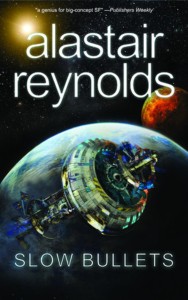 I’m not very knowledgeable about Golden Age SF, and yet I would risk saying that Slow Bullets has most of its roots in precisely that era of the genre. It is lean, straightforward, functioning mostly on the strength of its focal conceits, and, of course, dealing with grand futuristic ideas. It definitely suffers in terms of complexity and veracity because of these same design features, but one could always argue that was done on purpose. Sacrificing depth for the sake of densely packed conceptual entertainment, pitched against a backdrop of cosmological scale, rarely works with longer fiction. Here, though, in the span of fewer than 200 pages, this compression is quite functional. The author probably had much fun writing this short piece, knowing from the get-go that he didn’t have to dig very deep in psychology, sociology, any –ology for that matter. It’s a pre-New Wave, pre-cyberpunk piece that just goes for that old thrill of exploring a bundle of great concepts, not caring that much about anything else. I imagine it can be a liberating experience for a modern author, to just go with the flow, for the sake of the flow, on a rare occasion. I certainly enjoyed reading it, it took me just a bit more than the duration of my flight to finish, and its succinctness is a quality worthy of applause.
I’m not very knowledgeable about Golden Age SF, and yet I would risk saying that Slow Bullets has most of its roots in precisely that era of the genre. It is lean, straightforward, functioning mostly on the strength of its focal conceits, and, of course, dealing with grand futuristic ideas. It definitely suffers in terms of complexity and veracity because of these same design features, but one could always argue that was done on purpose. Sacrificing depth for the sake of densely packed conceptual entertainment, pitched against a backdrop of cosmological scale, rarely works with longer fiction. Here, though, in the span of fewer than 200 pages, this compression is quite functional. The author probably had much fun writing this short piece, knowing from the get-go that he didn’t have to dig very deep in psychology, sociology, any –ology for that matter. It’s a pre-New Wave, pre-cyberpunk piece that just goes for that old thrill of exploring a bundle of great concepts, not caring that much about anything else. I imagine it can be a liberating experience for a modern author, to just go with the flow, for the sake of the flow, on a rare occasion. I certainly enjoyed reading it, it took me just a bit more than the duration of my flight to finish, and its succinctness is a quality worthy of applause.
The story, though certainly not convoluted, is much more complex that what you might expect from such a slim book. In the beginning, Scur, a conscripted soldier in an internecine, galaxy-spanning, quasi-religious war, is captured and tortured by the enemy. Later, she awakes in a hibernation capsule on a huge FTL ship that has malfunctioned for some mysterious reason, on board with about a thousand war criminals on their way to prison. Knowledge about their plight is scarce and unpleasant surprises heap on top of one another. Scur has to act quickly, if she wants to save herself, the ship, and maybe much more than that.
Giving up more of the story would serve no purpose, as Slow Bullets relies mostly on that to move along and deliver its punches. Character development is largely token, the writing itself is not much more detailed, and though some would call this text hard SF, it is far from air-tight scientific plausibility. This lean approach combines well with the parabolic feel of the novelette, as it virtually leaves you no time whatsoever to quibble about the sparseness of the data it presents. A quick succession of energetic conceptual jabs, and that’s it, now go ponder the vastness of the universe and the infinite malleability of the human spirit.
Slow Bullets never pretends to be the container of any deep philosophical kernels. It does touch upon hefty topics like religion, identity, retribution, etc., but it does so in a matter-of-factly sort of way that is to an extent justified by the ending of the book. It’s a rather limited approach to fiction, but it works fine in these constraints and serves to highlight the already mentioned conceptual density of which the genre is so conducive. The concept of the slow bullets – computational devices that burrow into soldiers’ bodies and serve as records for their memories and identities – is particularly successful, in that Reynolds manages to layer several planes of interpretation, literal and metaphorical, over that image. It is a rather mechanistic fusion of meanings, but the voice, tone and vigor of the book certainly make it a viable one.
There is not much else to write about this rather fast bullet of a novel. You’d be better off to just go read it, really. It may lack significantly in terms of texture (and Reynolds has shown convincingly that he can capture high-dimensional texture, especially in Blue Remembered Earth), but it compensates for that with pithiness and dash. I am almost tempted to subcategorize it in the non-genre of SF parable, a curious thought, bearing in mind that it also deals with cosmological space-time magnitudes and is firmly embedded in space opera. Funny thing, this SF, you never know how it may surprise you.
PS: Special thanks to Tachyon Publications and Netgalley for the ARC.